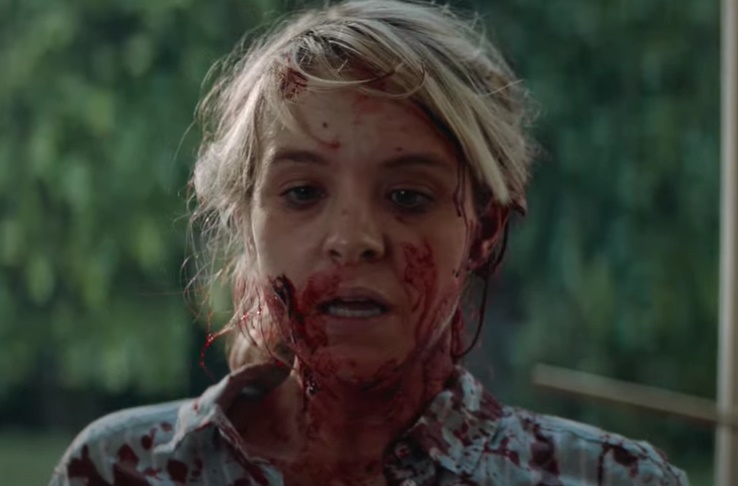V/H/S/85
by Hope Madden
If found footage, horror anthologies and 80s nostalgia are your thing, V/H/S/85 is speaking your language. The sixth episode in the series straps on those heavy camcorders and uploads that security cam footage to remind us of all the horrors of the Reagan era.
Highlights include David Bruckner’s wraparound story, “Total Copy.” An alum of the 2012 original V/H/S and successful filmmaker behind The Ritual and the recent Hellraiser, Bruckner has a tricky assignment. The wraparound has to serve as an anchor for the balance of the short films while standing on its own. Bruckner’s tale delivers a VHS tape of security footage that’s been copied over with commercials, exercise videos, and other horrors. But the main story it tells, of an entity in lockdown being studied by researchers, is chilling, sometimes funny, and eventually pretty bloody.
Not to be outdone, Mike P. Nelson contributes two short films with one clever twist. The first, “No Wake” follows a group of campers who head out onto a lake despite posted signage forbidding it. And though things go predicably wrong for them, the actual execution (both by the director and of the characters) delivers genuine surprises, as does the twist in Nelson’s second outing, “Ambrosia” about a fundamentally bent family tradition.
“TKNOGD” (technogod), from Natasha Kermani (Lucky), is the most daring of the set, although it nearly outstays its welcome before hitting its stride. A performance artist laments the blossoming obsession with tech. The plausibility of the audience reaction is almost as much fun as the gory finale of her show.
Gigi Saul Guerrero (Satanic Hispanics, Bingo Hell) contributes a news piece gone wrong during Mexico City’s 1985 earthquake. What’s most effective is her use of the set to increase claustrophobia to high levels before bursting that tension with the bloody finale.
Scott Derrikson’s (Sinister, The Black Phone) “Dreamkill” is the most effective and imaginative of the set, plus there’s a Goth kid! Now that’s a reason to love the 80s! A police detective keeps receiving VHS tapes in the mail of murders that have not yet been committed. From the grim crime scenes to the plot twists to the almost funhouse architecture of the final acts of carnage, “Dreamkill” never lets go.
This is the strongest set of shorts in a V/H/S installment in a while. It’s fun, gory, creepy and bite sized – ideal for the season.


